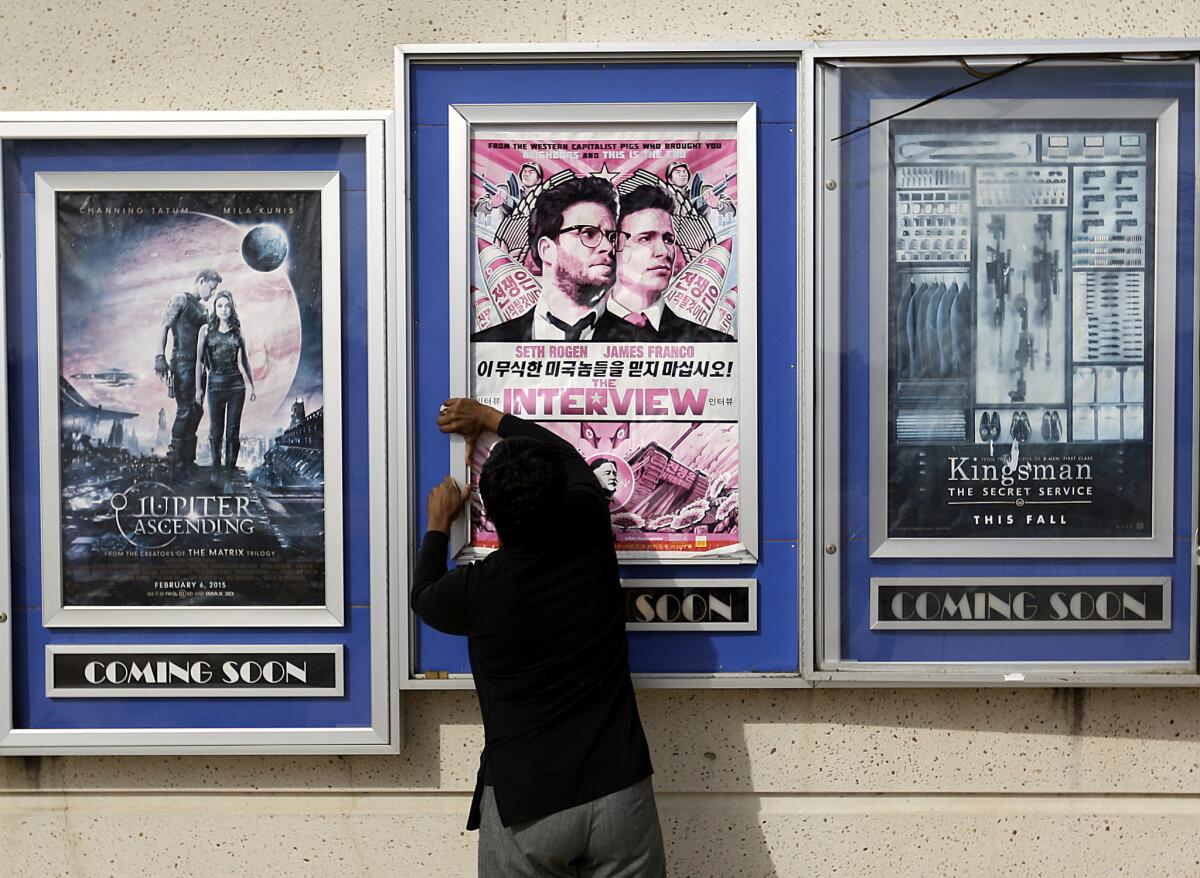Opinion: Sony’s DIY options for releasing ‘The Interview’ online

- Share via
As Rahm Emanuel famously said as President-elect Barack Obama prepared to take office, “You never want a serious crisis to go to waste. And what I mean by that is an opportunity to do things you think you could not do before.”
The hacking attack on Sony Pictures qualifies as a serious crisis for the company. The opportunity it creates, though, is the chance to break the distribution “windows” that have prevented Hollywood from making the most of its advertising dollars.
On Tuesday, Sony announced that it would release the movie that purportedly drew the hackers’ ire, “The Interview,” on Christmas Day after all. The hackers who’d claimed responsibility for the Sony attack, the self-proclaimed Guardians of Peace, had threatened unspecified but presumably non-peaceful actions against any theater that showed the movie, leading the five biggest theater chains to cancel plans to carry it. Sony responded by saying it had dropped its plans to release the movie, drawing a public rebuke from President Obama, prompting Sony Pictures’ top executive to say he really wanted to release the movie but no one would carry it.
Now, the studio says the movie will be in “limited release” starting Christmas Day, carried by a coalition of the willing: a cadre of small theaters and chains that A, resent being threatened and/or B, see box-office gold in standing up to the Guardians’ threats. (Judging by how quickly the Christmas Day showings at the Alamo Cinema Drafthouse were selling out, those betting on the box-office gold may be right.)
Bravo to all of them. Meanwhile, the major chains continue to stiff-arm “The Interview” for fear that the Guardians’ threat will persuade people to stay far, far away from any multiplex that carries it.
All of which should empower Sony to use the Internet to distribute the movie itself, worldwide, to anyone willing to pay to see it. The main barriers to such a move isn’t (and hasn’t been for some time) the technology required. It’s the major studios’ business model, which deters them from making films available for home viewing until long after the theaters have lost interest in them.
Sony seems to recognize the video-on-demand opportunity the major chains have teed up, but the studio has been having trouble pulling it off. That’s true in part because it’s ignoring how much it could do on its lonesome.
Studio executives have complained that pay-TV providers have declined to carry “The Interview,” and the top cable and satellite operators have confirmed as much. Over the weekend, Sony’s efforts to persuade Dish Network fell through, Fox Business reported, seemingly leaving the studio out of options.
Sony has a number of options for home video, however, that don’t require the support of the pay-TV cabal.
First and foremost is Crackle, a Sony-owned online video-on-demand service. The drawback is that Crackle is free, relying on advertiser support instead of charging pay-per-view fees. And in the traditional Hollywood model, movies don’t reach the “free” window until they’ve exhausted all the pay-per-view possibilities.
Nevertheless, releasing “The Interview” on Crackle offers two benefits to Sony. First, it could see how much more advertisers would be willing to pay to be associated with a (controversial and potentially huge) new movie, as opposed to one that’s already made the rounds on DVD, premium cable, Netflix, Redbox and online movie rental sites.
And second, frankly, Crackle could use the attention. The studio doesn’t release viewership statistics for the network, but Crackle’s YouTube channel had a little more than half a million subscribers, according to VidStatsX. Jimmy Kimmel’s following is 10 times bigger, Rihanna’s is 30 times larger, and PewDiePie’s is 60 times as large.
As for pay-per-view, it’s hard to beat YouTube’s reach. The service is available on tens of millions of TV sets that are connected to the Internet, directly or through a set-top box such as those by Roku and Apple. Although best known for its advertiser-supported videos, YouTube has pay-per-view capabilities too. Best of all, once a content provider has more than 1,000 subscribers, it can release pay-per-view titles without YouTube’s prior approval. In other words, unlike a closed system such as Apple’s iTunes, there appears to be no gatekeeper preventing Sony from dropping “The Interview” onto YouTube as a premium pay-per-view title.
The same is true for at least one YouTube rival, Vimeo, which offers content companies 90% of the revenue generated by their pay-per-view titles.
And then there’s the most radical and disruptive option of all, BitTorrent Bundles. As with Vimeo, BitTorrent offers content creators 90% of the revenue collected. And unlike other distributors, the data generated from BitTorrent sales go to the content owner, not BitTorrent. Beyond that, BitTorrent Bundles are delivered in a decentralized way, making it hard for an attacker to block or disrupt them.
The risk of a home-video release is that it could put the kibosh on the major chains ever showing “The Interview.” That’s no small concern, given how much Sony paid to make and market the film. On the other hand, the willingness of much smaller exhibitors to carry the film is already making the major chains look overly cautious. If they refuse to carry “The Interview” after the holidays, they’ll look petulant.
One other factor here is that reviewers haven’t been kind to “The Interview.” If the word of mouth from consumers is bad, there may not be much interest in the film after its opening weekend. That’s all the more reason for Sony Pictures to take advantage of the buzz around the film now, just in case moviegoers’ urge to stand up for the 1st Amendment and stick it to the Guardians isn’t as strong as their desire not to waste money on a bad film.
Follow Healey’s intermittent Twitter feed: @jcahealey
More to Read
A cure for the common opinion
Get thought-provoking perspectives with our weekly newsletter.
You may occasionally receive promotional content from the Los Angeles Times.







